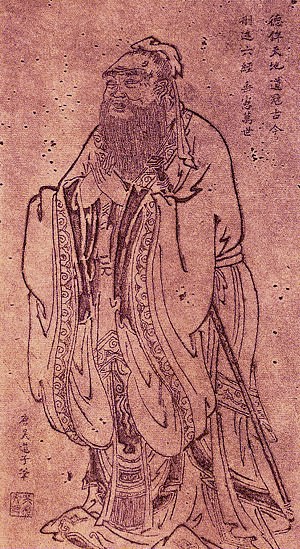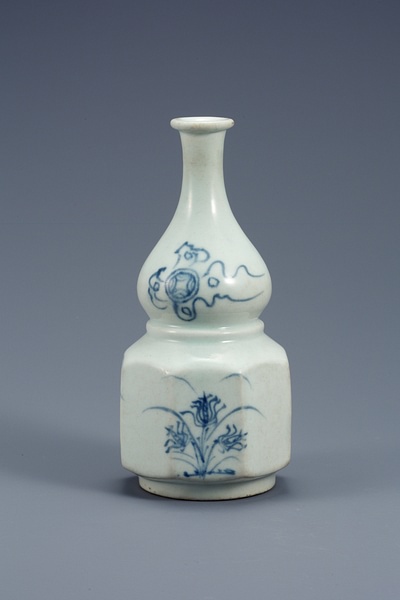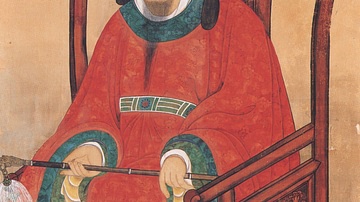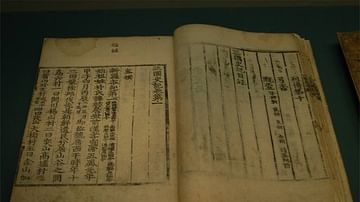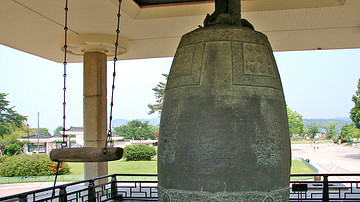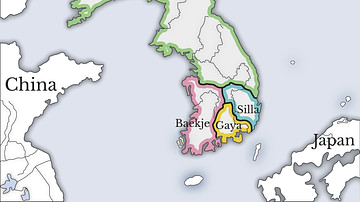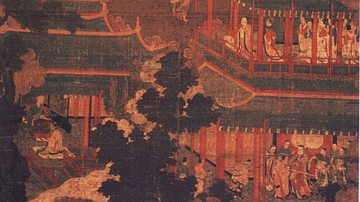Principles of Confucianism were adopted by successive dynasties and kingdoms in ancient Korea, and the study of classic Confucian texts was an important part of education and entrance examinations for the state administration. Confucianism was practised side-by-side with the official state religion of Buddhism and, amongst the lower classes, with shamanism and animism. By and large, Buddhism was the practised religion whilst Confucian principles were adopted for government and public life.
The Principles of Confucianism
Confucius (or Kongzi) was a Chinese philosopher who lived in the 6th century BCE and whose work was developed and codified by two important later philosophers, Mencius (or Mengzi) and Xunzi (or Hsun Tzu). Together these three figures created the philosophy known as Confucianism. Chief among its ideals are the importance of a virtuous life, filial piety, and ancestor worship. Also emphasised is the necessity for benevolent and frugal rulers with a high moral standing, the importance of inner moral harmony and its direct connection with harmony in the physical world and that rulers and teachers are important role models for wider society. They must be benevolent in order to win the affections and respect of the populace and not do so by force, which is futile. Politics, therefore, when following Confucian principles tended to focus on the intimacy of relationships rather than institutions.
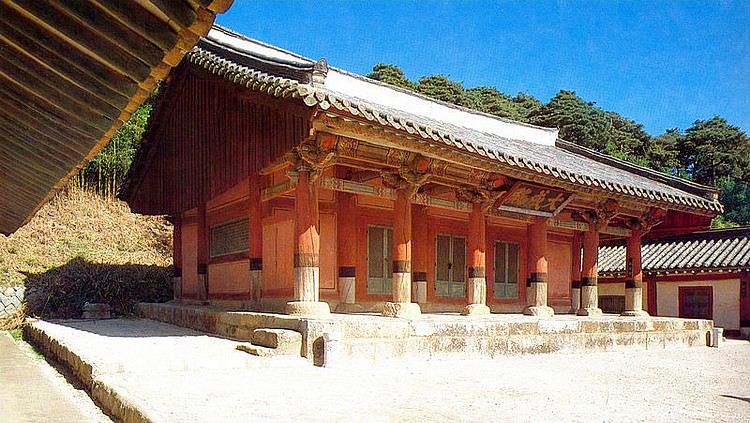
Another central pillar of Confucianism is that the moral harmony of the individual is directly related to cosmic harmony; what one does, affects the other. For example, poor political decisions can lead to natural disasters such as floods. An example of the direct correlation between the physical and the moral is evidenced in the saying, 'Heaven does not have two suns and the people do not have two kings.' A consequence of this idea is that, just as there is only one cosmic environment, there is only one true way to live and only one correct political system. If society fails it is because sacred texts and teachings have been misinterpreted; the texts themselves contain the Way but we must search for and find it.
Confucianism expounded the importance of four virtues which we all possess: benevolence (jen), righteousness (i), observance of rites (li) and moral wisdom (te). A fifth was later added - faith - which neatly corresponded to the five elements (in Chinese thought) of earth, wood, fire, metal and water. Once again, the belief that there is a close link between the physical and moral spheres is illustrated. By stating that all men have such virtues, two ideas are consequent: education must nurture and cultivate them and all men are equal - 'Within the four seas all men are brothers.'
Adoption by Korea
By the 2nd century BCE Confucianism was the official state religion of Han Dynasty China. During the Tang dynasty (618-907 CE) temples were established in the name of Confucius at all administrative capitals and the study of classic Confucian texts (e.g. Book of History, Book of Changes, Book of Songs, and Spring and Autumn Annals) became an essential part of the education of every member of the elite classes and they were tested on their knowledge of it in the examinations set for those wishing to join the state's civil service. Then Confucianism was given even greater importance by the subsequent Song dynasty (960-1279 CE). This pattern would be repeated when Confucianism was passed on to Korea, a long-time Chinese trade partner, probably via the Chinese commanderies which controlled the northern territories, especially Lelang, up to the 4th century CE.
In 372 CE a Confucian Academy was established in the Goguryeo kingdom of northern Korea. Queen Seondeok of Silla appointed Confucian scholars to her court in 636 CE. A little later, in the Unified Silla Kingdom, which now controlled all of the Korean peninsula, a National Confucian Academy (Gukhak) was founded in 682 CE which was decorated in 717 CE with a number of portraits of Confucius and prominent philosophers brought especially for the purpose from China. In 750 CE it was renamed the National Confucian University. Besides studying at home, many young men of aristocratic families were sent to study in China where they acquired the necessary knowledge of the Confucian classic texts to enter and pass Chinese administration examinations and gain valuable diplomatic experience which they could bring back to Korea and so further their career there.
In 788 CE an examination for state administrators based on Confucian texts was introduced in Korea on the Chinese model. Questions in these papers were largely based on the Analects and the Classic of Filial Piety, both of which contain conversations and sayings attributed to Confucius; especially relevant would have been those regarding proper behaviour and attitudes to superiors and the importance of human relationships to good government. By the 11th century CE 12 private academies, called the Twelve Assemblies (Sibi to), had been established which further spread Confucianism. One teacher, in particular, gained great fame, Choe Chung (984-1068 CE), who became known as 'the Confucius of Korea' and who, in 1055 CE, set up the first private Confucian school called the 'School of Nine Studies' (Kujae haktang) because there were nine areas of study.
Government and education were the main theatres of Confucian thought, albeit with some application to family roles and responsibilities, especially rituals of ancestor worship in the family shrine within each home. Buddhism, however, remained the official state religion, with shamanism and nature worship the main popular religions, largely pursued by the lower and more rural classes.
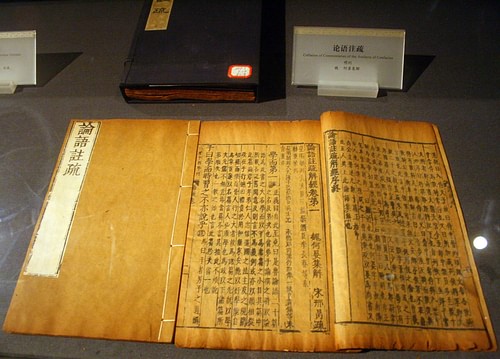
The adoption of Confucianism was not only an indicator of ancient Korea's willingness to adopt elements of Chinese culture but its very principles of filial piety and duty to one's superiors perpetuated a long-standing cultural admiration of all things Chinese and certain political subservience to its large and powerful neighbour. In return, China recognised Korea as 'a country of gentlemen' where 'gentlemen' here is termed junzi, as in the Confucian Analects text.
Practical Application & Manifestations
Confucianism is notoriously difficult to pin down and elaborate upon, based largely as it is on the original obscure and ambiguous short maxims attributed to Confucius himself, but rulers and ministers endeavoured to transfer certain ideals to their political approach. Hierarchy, rights, responsibilities, loyalties, and a sense of duty were all important Confucian features of Korean government. So too were a belief in a fixed social caste system (e.g. the Silla Bone Rank system) which was thought to preserve harmony and balance in the community – the 'know your place' attitude - and more intangible and unquantifiable beliefs such as trustworthiness, diligence, and respect. The historian Jinwung Kim summarises these principles and their effect on both internal and international Korean politics, thus:
Confucianism is based on an ideal model of relations between family members that called for special bonds between sovereign and subject, father and son, and husband and wife, as well as five moral disciplines. Confucianism generalized the family model and relationships of subjects to the state and to an international system. In political terms, these principles meant that a village followed the leadership of venerated elders, and citizens revered a king who was thought of as the father of the state. Generalized to international relations, the Chinese emperor was the big brother of the Joseon king. A conservative philosophy, Confucianism stressed tradition, strict social hierarchies, obedience to superiors, and identification of the father with the monarch. It adopted the proper rite as one of its major virtues and therefore paid careful attention to the performance of ritual. In the international context, it envisioned a China-centered world order. (Kim, J., 187)
Confucianism was not limited to the realm of politics and its principles can be seen in both the art, architecture, and literature of ancient Korea. In painting and calligraphy, the restraint of Confucian principles was an ideal to be strived for whenever possible. In ceramics, the white porcelain of the Joseon dynasty from the 14th century CE onwards reflects the no-nonsense, ordered and masculine tendencies of Confucian thought and it is no coincidence that it became the favourite of the Korean elite at that time and was widely used in Confucian rituals.
Another medium where Confucian themes were popular was screen painting, especially of the eight Chinese characters representing the munja-do or virtues of Confucianism. House architecture might also be dictated by Confucian principles, especially the belief that men and women should be separated and the two sexes, if strangers, should avoid meeting, hence the design of traditional homes of the Joseon dynasty with distinct areas for hosting guests and domestic work. Confucian philosophy also stresses the importance of examining the past and learning from it and this helped foster a Korean sense of history and national identity, as seen in the production of such famous history texts as the Samguk sagi and Samguk yusa from the 12th century CE.
Neo-Confucianism
From the 14th century CE a new brand of Confucianism, Neo-Confucianism (again originating in China), gained wide acceptance to the detriment of other faiths, especially Buddhism. With many points of similarity to its original philosophy Neo-Confucianism added a belief that all men could attain higher goals if they applied themselves. This principle resulted in a widening of the eligibility for state examinations, even if those from the elite still had a distinct advantage, such was the necessity for years of classical study prior to the examination. Neo-Confucianism, with its emphasis on clearly defined hierarchical roles for everyone in both public and private life, also resulted in a significant backwards step for women's rights and status in respect to their position in previous Korean thought systems which had drifted away from the original Confucianism.
This content was made possible with generous support from the British Korean Society.
